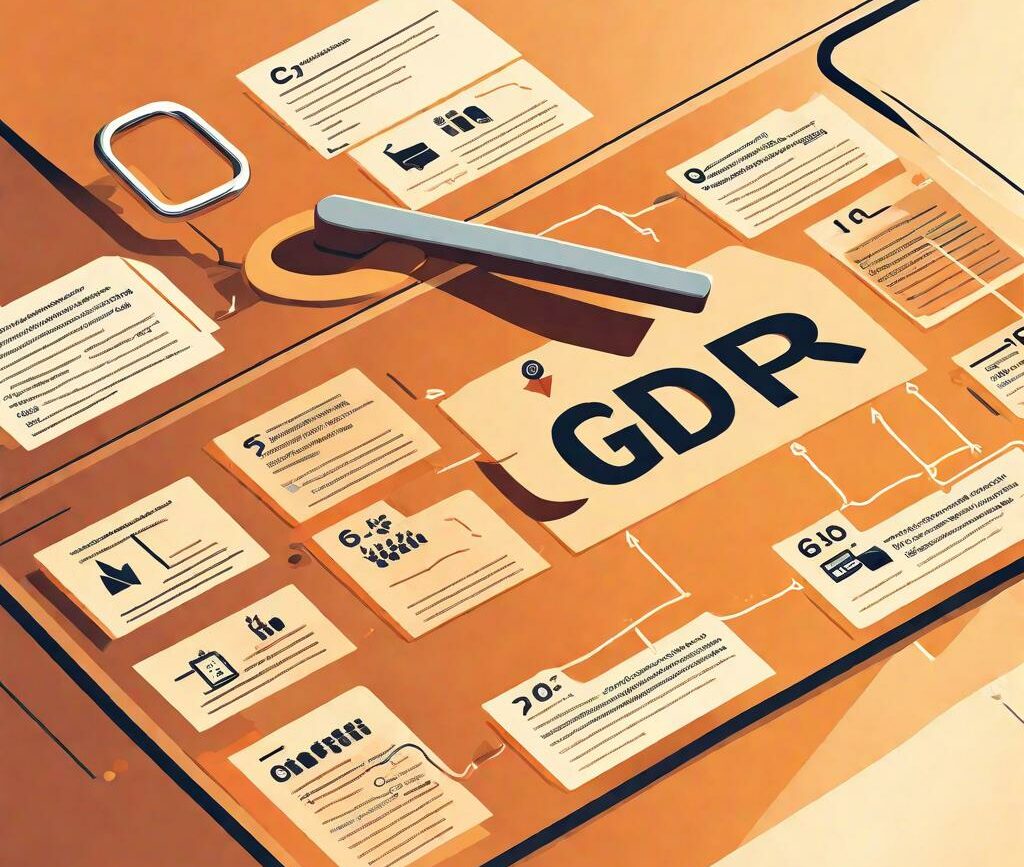
The General Data Protection Regulation (GDPR) is a comprehensive set of data protection laws implemented by the European Union (EU) in 2018. Its main objective is to enhance individuals’ control over their personal data and ensure its proper handling by organizations. Estate agency websites, which often collect and process personal data as part of their operations, are subject to GDPR requirements.
Compliance with GDPR is crucial for estate agency websites due to several reasons. Firstly, it helps build trust with clients and prospects by demonstrating a commitment to protecting their personal data. Second, non-compliance can result in severe consequences, including hefty fines and reputational damage. Lastly, GDPR compliance encourages responsible data handling practices, promoting transparency and accountability within the estate agency industry.
Key GDPR Principles and Their Implications for Estate Agency Websites
A. Lawfulness, Fairness, and Transparency
1. Obtaining Lawful Consent for Data Collection and Processing
Under GDPR, estate agency websites must obtain lawful consent from individuals before collecting and processing their data. This means that the consent must be freely given, specific, informed, and unambiguous. Website owners should clearly explain the purposes for which the data will be used, the rights of individuals, and how they can withdraw their consent. Employing granular consent options allows users to provide specific permissions for different types of data processing.
2. Ensuring Fairness in Data Handling Practices
Estate agency websites should ensure fairness in their data handling practices. This includes treating individuals’ personal data securely and confidentially. Estate agencies must provide individuals with the necessary information regarding their data handling and usage. It is crucial to inform users about how their data will be used, whether it will be shared with third parties, and the security measures in place to their information.
3. Maintaining Transparency with Privacy Policies and Notices
To comply with GDPR, estate agency websites should maintain transparency by providing clear and concise privacy policies and notices. These documents should outline how personal data is collected, processed, and stored. Privacy policies should also inform individuals about their rights under GDPR, such as the right to access their data, rectify any inaccuracies, and request erasure.
B. Purpose Limitation and Data Minimization
1. Identifying Lawful Purposes for Collecting Personal Data
Estate agency websites must identify lawful purposes for collecting and processing personal data. This typically involves collecting data necessary for the performance of a contract or with the individual’s explicit consent. It is essential to ensure that the data collected is adequate, relevant, and limited to what is necessary for the intended purpose.
2. Implementing Data Minimization Techniques for Privacy Protection
Data minimization is a crucial aspect of GDPR compliance. Estate agencies should implement measures to collect and retain the minimum amount of personal data required for their operations. This can be achieved by employing pseudonymization or anonymization techniques to protect individuals’ privacy.
3. Proper Disposal of Unnecessary or Outdated Data
To comply with GDPR, estate agency websites should establish processes for the proper disposal of unnecessary or outdated personal data. This involves regularly reviewing stored data and deleting information that is no longer required or relevant. Proper data disposal ensures that personal data is not retained longer than necessary and reduces the risk of unauthorized access or misuse.
C. Accuracy, Storage Limitation, and Integrity
1. Ensuring Accurate and Up-to-Date Personal Data
Estate agency websites must ensure the accuracy and currency of personal data they collect and process. It is crucial to implement processes to verify the accuracy of the information provided by individuals and update it when necessary. Regularly reviewing and maintaining accurate personal data is vital for providing reliable and effective services.
2. Setting Appropriate Retention Periods for Data Storage
GDPR requires estate agency websites to establish appropriate retention periods for different types of personal data. Retention periods should be determined based on the purpose for which the data is collected and the organization’s legal obligations. By setting clear retention periods, estate agencies can minimize the storage of personal data beyond what is necessary, reducing the risk of data breaches or unauthorized access.
3. Maintaining Data Integrity and Protecting Against Unauthorized Alterations
Estate agency websites should implement measures to maintain the integrity of personal data and protect it against unauthorized alterations. This can be achieved through accurate record-keeping, ensuring data is not modified without proper authorization. Additionally, implementing access controls and regular monitoring helps detect any unauthorized changes to personal data and mitigates the risk of data tampering or manipulation.
D. Accountability, Security, and Data Breach Notification
1. Establishing Accountability Mechanisms for GDPR Compliance
Accountability is a core principle of GDPR. Estate agency websites must establish mechanisms to demonstrate compliance with GDPR requirements. This includes maintaining records of data processing activities, conducting regular audits, and appointing a Data Protection Officer (DPO) if required. Demonstrating accountability ensures that estate agencies are proactive in ensuring the privacy and security of personal data.
2. Implementing Robust Security Measures to Safeguard Personal Data
Estate agency websites should implement robust security measures to safeguard the personal data they handle. This includes implementing encryption, access controls, secure storage, and regular vulnerability assessments. By adopting these security measures, estate agencies can reduce the risk of data breaches and unauthorized access.
3. Understanding the Requirements for Data Breach Notification
In the event of a data breach, estate agency websites must comply with GDPR requirements for data breach notification. This involves notifying the relevant supervisory authority within the specified timeframes and, in certain cases, informing affected individuals. Prompt and transparent communication in the event of a data breach demonstrates accountability and builds trust with clients and prospects.
GDPR Compliance Measures for Estate Agency Websites
A. Conducting a Data Audit for GDPR Compliance
To ensure GDPR compliance, estate agency websites should conduct a comprehensive data audit. This includes identifying the types of personal data collected and processed, mapping data flows across the website, and evaluating the GDPR compliance of third-party providers. A data audit provides a clear understanding of the personal data lifecycle and ensures compliance with GDPR requirements.
B. Implementing Privacy by Design and Default
To comply with GDPR, estate agency websites should integrate privacy considerations into their website development processes. This involves incorporating privacy features and controls from the early stages of website design and development. Examples include incorporating user privacy settings, consent management tools, and ensuring that data protection measures are automatically embedded into the website’s infrastructure.
C. Managing Consent and Individual Rights
Obtaining valid consent for data processing activities is crucial for GDPR compliance. Estate agency websites should ensure that consent is freely given, specific, informed, and unambiguous. Additionally, the rights of individuals, such as the right to access, erasure, and rectification, should be facilitated and respected. Estate agencies must have processes in place to address consent withdrawal and provide opt-out mechanisms to ensure ongoing compliance.
Best Practices for Maintaining GDPR Compliance
A. Regular Data Protection Training and Awareness for Estate Agency Staff
Providing regular data protection training and raising awareness among estate agency staff is essential for maintaining GDPR compliance. Employees should be educated on GDPR principles, best practices for data privacy and security, and be made aware of potential risks and consequences of non-compliance. Encouraging a culture of privacy and compliance within the agency ensures that all staff members understand their responsibilities and actively contribute to GDPR compliance efforts.
B. Conducting Periodic Data Protection Impact Assessments (DPIAs)
Periodic Data Protection Impact Assessments (DPIAs) help estate agency websites assess and mitigate privacy risks associated with their data processing activities. DPIAs involve identifying high-risk processing activities, evaluating the necessity and proportionality of data processing, and documenting findings and recommendations to address any identified risks. Conducting DPIAs allows estate agencies to proactively identify and address privacy risks, ensuring ongoing compliance with GDPR.
C. Establishing a Data Protection Officer (DPO) Role, if Required
A Data Protection Officer (DPO) plays a crucial role in ensuring GDPR compliance within estate agency websites. The DPO is responsible for advising on data protection matters, monitoring compliance with GDPR requirements, and acting as a point of contact between the estate agency and relevant supervisory authorities. Whether a DPO is required depends on the scale and nature of the data processing activities carried out by the estate agency. If required, it is important to ensure that the DPO has independence, expertise, and appropriate resources to fulfill their responsibilities effectively.
Summary

Complying with GDPR requirements is essential for estate agency websites to protect personal data and maintain client trust. By understanding the key principles and implementing the necessary compliance measures, estate agencies can ensure the security, fairness, and transparency of their data handling practices. Regular data protection training, conducting DPIAs, and establishing a DPO role, if required, further strengthen GDPR compliance efforts. Ultimately, GDPR compliance establishes a foundation for responsible data handling practices and fosters trust between estate agencies and their clients.
Frequently Asked Questions (FAQs)
What personal data is typically collected and processed by estate agency websites?
Estate agency websites typically collect and process personal data such as names, addresses, contact information, financial information, and property preferences. This data is necessary for providing services such as property listings, property valuations, and facilitating property transactions.
How can estate agency websites obtain valid consent under GDPR?
To obtain valid consent under GDPR, estate agency websites should ensure that consent is freely given, specific, informed, and unambiguous. This can be achieved by providing clear information about the purposes of data processing, the rights of individuals, and how they can withdraw their consent. Employing granular consent options allows users to provide specific permissions for different data processing activities.
What are the consequences of non-compliance with GDPR for estate agencies?
Non-compliance with GDPR can have severe consequences for estate agencies. This includes potential fines of up to 20 million euros or 4% of global annual turnover, whichever is higher. Additionally, non-compliance can result in reputational damage, loss of client trust, and legal proceedings.
Are there any exemptions or specific considerations for small estate agency businesses?
GDPR applies to all organizations, regardless of their size. However, some specific considerations and exemptions may apply to small estate agency businesses. It is essential for small estate agencies to seek legal advice and ensure compliance with GDPR requirements applicable to their operations.
What steps can estate agencies take to respond to a potential data breach?
In the event of a potential data breach, estate agencies should follow a comprehensive incident response plan. This includes notifying the relevant supervisory authority within the specified timeframes, conducting a thorough investigation to assess the extent of the breach, providing appropriate communication to affected individuals, and implementing measures to prevent future breaches. Seeking legal advice and collaborating with cybersecurity professionals is crucial for an effective data breach response.




